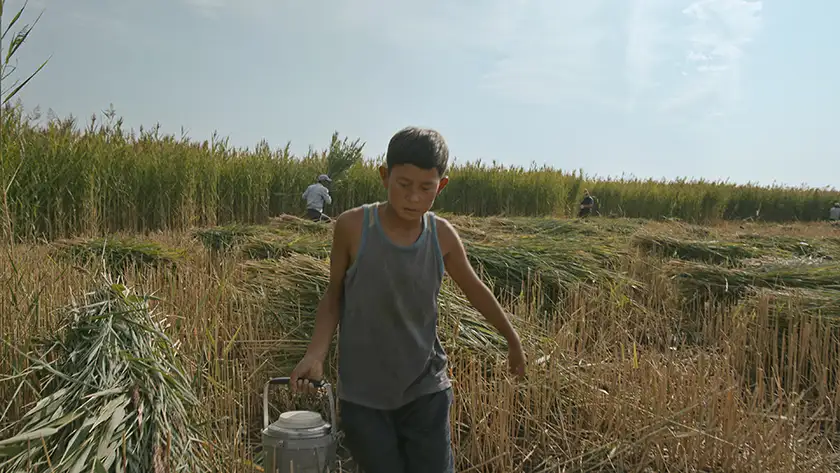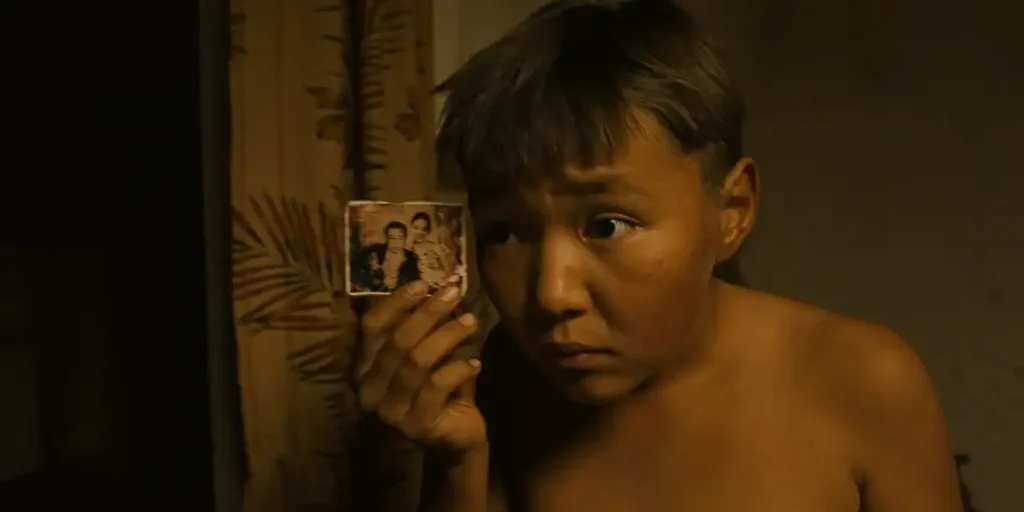Kazakhstan’s official entry for Best International Feature tackles the legacy of the bauryna salu tradition with devastating realist bite.
Writer & Director: Askhat Kuchinchirekov
Genre: Drama
Run Time: 113′
World Premiere: September 28, 2023 at San Sebastian
U.S. Release: TBA
U.K. Release: TBA
‘Write what you know’ goes the old adage, a cliché some argue, but one that has nonetheless borne out in the first films of countless greats. Chaplin, Truffaut and Sembène all drew inspiration from real life for their directorial debuts; more recently we saw Carla Simón do the same in Summer 1993, about the aftermath of her mother’s death, while Charlotte Wells’ Aftersun reexamined her last summer with her father to equally devastating effect.
Askhat Kuchinchirekov’s Bauryna Salu feels of a piece with these latter films, not only for its studious and authentic depiction of familial trauma, but for its announcement of a distinctive voice in world cinema.
Bauryna salu is a traditional nomadic custom by which a first-born child is given to and raised by their grandparents, far from their immediate family. In the case of our protagonist, 12-year-old Yersultan (Yersultan Yerman), that means growing up with his elderly grandmother in a cramped home as part of an impoverished rural village. When his guardian passes away, Yersultan returns to the family he has never known, opening years-old psychological wounds and forcing him to rebuild his life in what shouldn’t be, but is, an alienating milieu.
The film’s subject is as close an issue to Kuchinchirekov’s heart as those depicted in the work of Simón and Wells were to theirs. He was given away to his grandmother in accordance with bauryna salu at just a year old and this is his excavation of that experience; newcomer Yerman is thus the director’s conduit and his performance critical to the film’s authentic storytelling. The young lead is a natural as a damaged boy whose conservative community has wrapped him in a veil of stoic masculinity. Throughout his solo scenes, scrutinising the mirror as he compares his face to a tiny photo of his parents, or lying in the grave that will soon be his grandmother’s final resting place, Yersultan’s silent suffering is beautifully portrayed; in a western picture, with all the attention that status garners, his would be a star-making turn.
DP Zhanrbek Yeleubek shoots with an impressive sense of cinéma vérité, particularly in the film’s first act as Yersultan and his peers complete gruelling physical labour. The camera rarely sits still, its long takes dancing around the subjects with an immersive gaze, sometimes uncomfortably so. This style imparts a vital sense of naturalism, yet Yeleubek is not afraid of making his presence known on occasion. One of many tracking shots, inside a cramped van as Yersultan travels to his new home, is almost Scorsese-esque in how it snakes through the space, capturing the visages of every passenger present. Great care is also made to texturise the images through lighting and colour; dilapidated mudbrick houses have never looked so good.

In combining this sophisticated visual language with such a gritty subject matter, Bauryna Salu suggests Kuchinchirekov as a natural successor to the great post-communist auteurs like Béla Tarr and Cristian Mungiu. Like the former, Kuchinchirekov utilises the film’s pastoral setting and the powerless animals that populate it in a resonant motif: ‘What am I, just cattle you can give away?’ cries Yersultan in a rare confrontation with his biological father. Such a sense of helplessness in the face of rigid cultures and institutions, typical of contemporary Eastern European realism, is conveyed with a viscerality missing from much of western drama.
Similarly, a sequence depicting Yersultan’s difficulties settling into a new, lawless school recalls the 2014 Ukrainian film The Tribe, another debut with an amateur cast, where a boarding school for the deaf-and-dumb provides as little protection to its young students as Yersultan’s surroundings do to him. Hailing from a country where the legacy of the Soviet Union still looms large, Kuchinchirekov is especially well-placed to investigate such themes, and though the film foregrounds his personal story, this socio-political element is incorporated with a deft touch.
It’s little wonder that Kuchinchirekov’s film has been chosen as Kazakhstan’s entry for Best International Feature at the next Academy Awards. Having achieved just one nomination in 17 previous attempts, any potential success at the event’s 97th edition would be a miracle for Khazakstani cinema, but few directorial debuts have merited such attention as much as Bauryna Salu. It’s an astonishing achievement from a cast and crew whose stories, one hopes, have only just begun.
Bauryna Salu: Movie Plot & Recap
Synopsis:
Following the nomadic tradition of bauryna salu, Yersultan was given to his grandmother at birth to be raised. After his guardian passes away, the 12 year old is forced to return to a family and community that is now alien to him, opening up years-old psychological wounds.
Pros:
- A devastating breakout performance from the young lead
- Realist visual style with a surprisingly lush colour pallet
- Kuchinchirekov’s personal story is injected with a subtle socio-political critique
Cons:
- Nothing
Bauryna Salu is Kazakhstan’s submission for Best International Feature at the 2025 Academy Awards.

